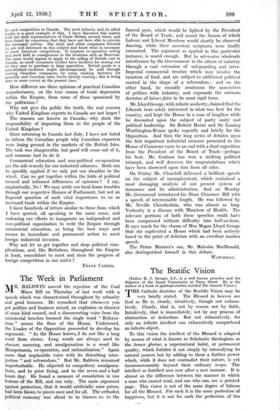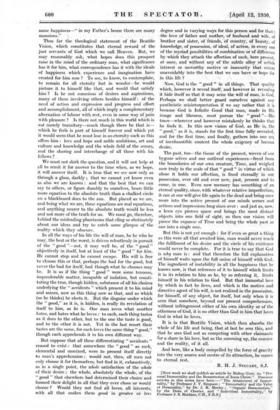The Beatific Vision
[Father. R. J. Steuart, S.J., is a well known preacher and the Superior of the Jesuit Community at Farm Street. He is the
author of a book of spiritual studies entitled The Inward Vision.] THE Catholic doctrine of the Beatific Vision may be very briefly stated. The Blessed in heaven see God as He is, clearly, intuitively, though not exhaus- tively. Clearly, that is, not by reason nor by faith. Intuitively, that is immediately, not by any process of abstraction or deduction. But not exhaustively, for only an infinite intellect can exhaustively comprehend an infinite object. To this vision the intellect of the Blessed is adapted by means of what is known to Scholastic theologians as the lumen gloriae, a supernatural habit, or permanent quality, which fortifies it not simply by intensifying its natural powers but by adding to them a further power which, while it does not contradict their nature, is yet incommensurably beyond their ordinary scope. The intellect so fortified sees now after a new manner. It is almost as the difference between the manner in which a man who cannot read, and one who can, see a printed page. This vision is not of the same degree of fulness for all the Blessed. For each it is the same perfection 'of happiness, but it is not for each the perfection of the same happiness—" in my Father's house there are many mansions."
Thus far the theological statement of the Beatific Vision, which constitutes that eternal reward of the just servants of God which we call Heaven. But, we may reasonably ask, what hopes does this prospect raise in the mind of the ordinary man, what significance has it for him, what correspondence has it with the ideals of happiness which experience and imagination have created for him now ? To see, to know, to contemplate, to remain for all eternity lost in wonder—he would picture it to himself like that, and would that satisfy him ? Is he not conscious of desires and aspirations, many of them involving others besides himself : of the need of action and expression and progress and effort and accomplishment, all of which imply a complementary alternation of labour with rest, even in some way of pain with pleasure ? Is there not much in this world which is not merely transitory—much though there be that is— which he feels is part of himself forever and which yet it would seem that he must lose in an.eternity such as this offers him : love and hope and noble ambitions, art and culture and knowledge and the whole field of the senses, and the sharing and interchange of all these with his fellows?
We must not shirk the question, and it will not help at all to remit it for, answer to the time when, as we hope, it will answer itself. It is true that we see now only as through a glass, darkly ; that we cannot yet know even as also we are known : and that the best that we can say to others, or figure dumbly to ourselves, bears little more equation to the absolute truth than a chalked circle on a blackboard does to the sun. But placed as we are, and being what we are, these equations are real equations, and anything nearer to the absolute truth would be less and not more of the truth for us. We must go, therefore, behind the misleading phantasms that cling so obstinately about our ideas and try to catch some glimpse of the reality which they obscure.
In all the ways of his life the will of man, be he who he may, the best or the worst; is driven relentlessly in pursuit of the " good "—not, it may well be, of the " good " objectively in itself, but at least of the " good " for him. He cannot stop and he cannot escape. His will is free to' choose this or that, perhaps the bad for the good, but never the bad for itself, bad though what he chooses may be. It is as if the thing. " good " were some tenuous, imponderable matter, incapable of isolation, but consti- tuting the true, though hidden, substance of all his choices underlying the " accidents " which present it to his mind and senses, now as this thing now as that, and as which (so he thinks) he elects it. But the disguise under which the " good," as it is, is hidden, is really its revelation of itself to him, as he is. One man loves what another hates, and hates what he loves : to each, each thing tastes as it does to the other, but to the one the taste is good, and to the other it is not. Yet in the last resort their tastes are the same, for each loves the same thing " good," though each apprehends it in his own different way.
But suppose that all these differentiating " accidents" ceased to exist : that somewhere the " good " as such, elemental and unmixed, were to present itself directly to man's apprehension : would not, then, all men not only choose it for themselves, but find in it, exhaustively, as in a single point, the whole satisfaction of the whole of their desire ; the whole, absolutely the whole, of the " good ".that elsewhere had determined their choice and.
formed their delight in all that they ever chose or would choose ? Would they not find all loves, all interests, with all that makes them good in greater or less degree and in varying ways for this person and for that : the love of father and mother, of husband and wife, of brother and sister, of friends, of country, of beauty, of knowledge, of possession, of ideal, of action, in every one of the myriad possibilities of combination or of difference by which they attach the affection of each, here present, at once, and without any 'of the subtle alloy of selfish interest or unworthy motive or insecurity that enters unavoidably into the best that we can have or hope for in this life ?
Now, God is the " good " in all things. That quality which, however it reveal itself, and however in revealing it hide itself so that' it may seize the will of man; is God. Perhaps we shall better guard ourselves against any pantheistic misinterpretation if we say rather that it is because God is Infinite Good that man, made in His image and likeness, must pursue the " good "—His trace—wherever and however mistakenly he thinks that he finds it. In this new vision of God, as He is, the " good," as it is, stands for the first time fully revealed, and for the first time, and finally, gathers into one act of inexhaustible content the whole exigency of human desire.
The past, too—the tissue of the present, woven of our bygone selves and our outlived experiences—freed from the boundaries of our own creature, Time, and weighed now truly in the scale of that " good " in virtue of which alone it holds our affection, is fixed eternally in our possession, ever old and ever new,- past,' present and to come, in one. Even now memory has something of an eternal quality, since, with whatever relative imperfection, it can at our will give life again to the dead and bring once more into the active present of our minds scenes and actions and impressions long since over : and just as, now, a keen eye pierces space and brings the most distant objects into one field of sight, so then our vision will pierce the expanse of Time and bring the whole past as one into a single now.
But this is not yet enough-: for if even so great a thing as this were all that awaited him, man would never reach the fulfilment of his desire and the circle of his existence would never be complete. For it is true to say' that God is why man is : and that therefore the full explanation of himself waits upon the full union of himself with God. The ingredient of instability in all the happiness that he knows now, is that reference of it to himself which limits it in its relation to him as he, by so referring it, limits himself in his relation to God. But that immortal love by which in fact he lives, and which is the motive and directive agent of his will, is not realiied in the tiossession, for himself, of any object, for itself, but only when it is seen that somehow, beyond our present comprehension, without infringement either of his own identity or of the otherness of God, it is no other than God in him that loves God in what he' loves.
It is in that Beatific Vision, which then absorbs the whole of his life and being, that at last he sees this, and that he sees God not as competing with other clainiants for a share in his love, but as the summing up, the essence and the reality, of it all.
And here, like a body compelled by the force of gravity into the very source and centre of its attraction, he comes to eternal rest.
R. H. J. STEUAR'r, S.J.
[Next week we shall publish an article by Bishop Clore, on " Per- sonal Immortality and the Resurrection of Jesus Christ," Previous articles in this series have been :—" The Attainment of Immor- tality," by Professor J. Y. Simpson ; " Immortality and the Value of Personality," by Dr. J. K. Motley " Organic Resurrection," by the Dean of Chester, and " Individual Immortality," by Professor J. S. Haldane, C.H., F.R.S.]



























































 Previous page
Previous page